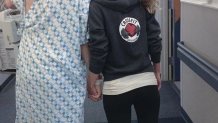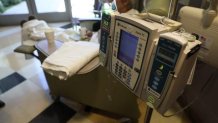Matt Fontanesi, 37, was celebrating his honeymoon when an unexpected, life-changing medical diagnosis brought his and his wife’s life to a standstill. Three days into their celebration, Fontanesi felt ill and got a medical check-up in Northern Idaho. He joked that it was just a cold or flu and that he didn’t need to see a doctor.
Fontanesi, then 33, was living in New Zealand, working as an engineer and enjoying life abroad with his wife, Dani.
Suddenly, while thousands of miles from home, a doctor in Idaho told Fontanesi his blood count was critically abnormal. A symptom of either AIDS or cancer, the doctor explained.
“This was our honeymoon,” Fontanesi recalled. “My blood was 90 percent cancer. When [Matt’s wife] would ask the doctors, ‘Is Matt going to make it?’ They wouldn't look her in the eye.”
Fontanesi quickly learned he had acute myeloid leukemia, and that cancer had been attacking his body for an undetermined period of time prior to the honeymoon. The newlyweds put their celebration on hold to confront this life-changing diagnosis.

Sadly, Fontanesi’s story is not unique. According to the San Diego County Health and Human Services Agency, dozens of young men and women, ages 15 to 44, are diagnosed each year with blood cancer. From 2011 to 2016, patients ages 15 to 24 diagnosed with leukemia in San Diego County grew by 83 percent.
Local
Doctors say it’s crucial to spot the disease early, a sometimes difficult task with patients under 40, who often brush off illness and don’t get regular check-ups.
“Recognizing it early is difficult because the symptoms of acute leukemias can mimic so many other things, especially things like fatigue or low-grade fever or weight loss,” Dr. Matthew Wieduwilt, a hematologist-oncologist for Moores Cancer Center at UC San Diego Health told NBC 7.
That’s what happened with Fontanesi.
“I was working a ton,” he recalled. “I was 33, and 33-year-olds ignore a cold. I drank some soup, took some Airborne and ignored it.”
“Oftentimes bloodwork is not done because people think it's an infection: you're in college, you've been studying too long, you haven't got enough rest and there are infections going around,” said Mandy Schlichthoz, a case management nurse at Moores Cancer Center. “Cancer is not the first thought you would have.”
Before his diagnosis, Fontanesi couldn’t imagine even the possibility of cancer.
“A lot of old people get it, and a lot of children, but not a lot in between,” Fontanesi always thought. “But we’re here and it’s real.”
In San Diego County, from 2015 to 2016, the number of patients ages 15 to 24 hospitalized with leukemia doubled from 17 to 33 patients, according to data from the San Diego County Health and Human Services Agency.
While coping with a cancer diagnosis is a significant challenge in itself, young cancer patients often face more than the usual problems with the cost of medical treatment and living expenses.
Matt had health insurance but said his insurance company pushed back against paying his medical bills.
“They actually flew a large claims representative here from Australia to try and negotiate with us,” Fontanesi told NBC 7. “‘Oh, maybe you only need half a treatment.’ No sir, I need the full treatment.”
Fontanesi said his insurance company then repeatedly tried to cancel his policy.
Without health insurance, just one of his many medications would have cost Fontanesi an estimated $6,000 per month. His repeated long-term hospital stays cost $10,000 per day.

The County Health and Human Services Agency reports one in five people between the ages of 18 and 44 do not have health insurance, compared to 98.5% of patients 65 and older who reported having health insurance.
“Then there's the underlying financial status of adolescents and young adults who are often in a school or just starting their careers and may not have the financial savings and income to really support their needs during this time,” Dr. Wieduwilt said.
Those non-medical expenses quickly depleted Fontanesi and his wife’s savings. Because the couple was living in New Zealand when they left for their honeymoon, Fontanesi and his wife had to rent and outfit a sterile apartment from scratch, with just the clothes in their suitcases. The couple started a blog and a GoFundMe campaign to help make ends meet.
“Generally when you're treating older patients they're more established in their lives whereas younger patients can be in school, they can be forming new relationships, they can potentially just be getting married, they can have very young children,” said Dr. Wieduwilt.
“Basically their lives are put on a complete hold of unknown duration. So dealing with the unknown, the lack of control is often very hard on patients,” he added.
Dr. Wieduwilt said another challenge can be starting a family when you have a cancer diagnosis.
Fontanesi considers himself one of the lucky ones. Now -- four years after his diagnosis and living in Chula Vista -- he’s in remission and the couple says they were also blessed with a happy, healthy baby born this past spring.
“It’s a little piece of our life that we've gotten back, that cancer hadn't stolen from us,” he said, recalling the day they learned they were pregnant.
Fontanesi wanted to give back and “pay it forward” for the outpouring of support he received throughout his journey.
So, he helped establish the Young Adult Leukemia and Lymphoma Alliance (YALLA-SD) at UCSD’s Moores Cancer Center. It provides a welcoming space for young adults with any kind of cancer to bond and talk frankly about their illness. They meet on the second Wednesday of every month at the Moores Cancer Center.
To learn more information about the group, click here.
The Leukemia and Lymphoma Society’s local chapter and Sharp Memorial Hospital, also have support meetings for cancer patients, some aimed at young adults.
Fontanesi said having a formal or informal support group and learning more about the special challenges facing young adults with cancer will help patients and their loved ones navigate the challenge.
“Cancer is a terrifying experience. I could not have done it without my wife,” Fontanessi said. “It's a bit morbid to say, but I know that cancer will come back. That is my statistical reality. The idea of cancer will always live with me.”
This story took flight when the NBC 7 Investigates staff learned that our summer intern, Sophia McCullough, is a leukemia survivor. Mari Payton talked with Sophia, a recent UCSD graduate, about her personal experience with cancer, and how it helped shape her reporting on this story. Watch their conversation below.



